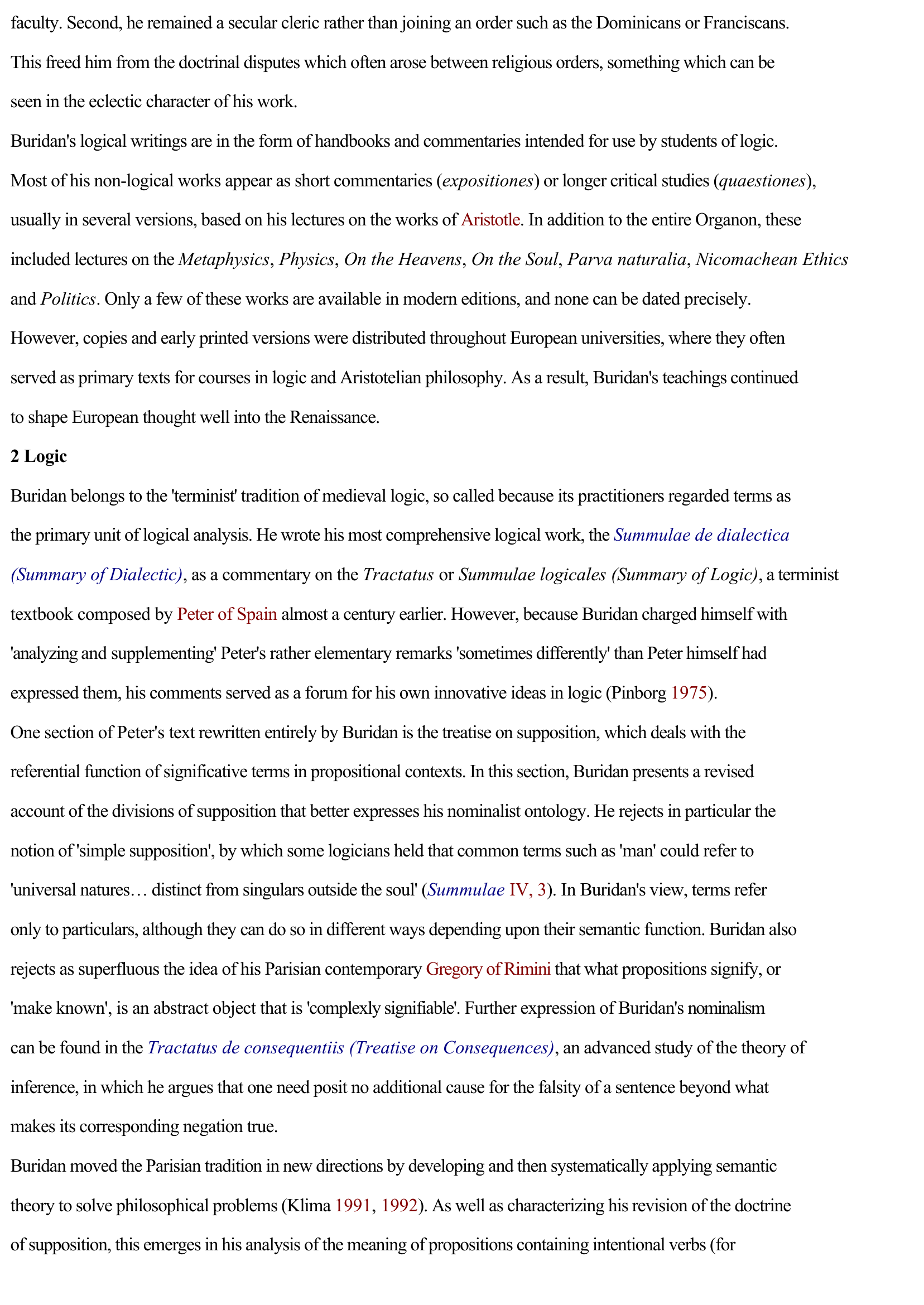Buridan, John
Publié le 22/02/2012

Extrait du document
«
faculty.
Second, he remained a secular cleric rather than joining an order such as the Dominicans or Franciscans.
This freed him from the doctrinal disputes which often arose between religious orders, something which can be
seen in the eclectic character of his work.
Buridan's logical writings are in the form of handbooks and commentaries intended for use by students of logic.
Most of his non-logical works appear as short commentaries ( expositiones ) or longer critical studies ( quaestiones ),
usually in several versions, based on his lectures on the works of Aristotle .
In addition to the entire Organon, these
included lectures on the Metaphysics , Physics , On the Heavens , On the Soul , Parva naturalia , Nicomachean Ethics
and Politics .
Only a few of these works are available in modern editions, and none can be dated precisely.
However, copies and early printed versions were distributed throughout European universities, where they often
served as primary texts for courses in logic and Aristotelian philosophy.
As a result, Buridan's teachings continued
to shape European thought well into the Renaissance.
2 Logic
Buridan belongs to the 'terminist' tradition of medieval logic, so called because its practitioners regarded terms as
the primary unit of logical analysis.
He wrote his most comprehensive logical work, the Summulae de dialectica
(Summary of Dialectic) , as a commentary on the Tractatus or Summulae logicales (Summary of Logic) , a terminist
textbook composed by Peter of Spain almost a century earlier.
However, because Buridan charged himself with
'analyzing and supplementing' Peter's rather elementary remarks 'sometimes differently' than Peter himself had
expressed them, his comments served as a forum for his own innovative ideas in logic (Pinborg 1975 ).
One section of Peter's text rewritten entirely by Buridan is the treatise on supposition, which deals with the
referential function of significative terms in propositional contexts.
In this section, Buridan presents a revised
account of the divisions of supposition that better expresses his nominalist ontology.
He rejects in particular the
notion of 'simple supposition' , by which some logicians held that common terms such as 'man' could refer to
'universal natures… distinct from singulars outside the soul' (Summulae IV, 3 ).
In Buridan's view, terms refer
only to particulars, although they can do so in different ways depending upon their semantic function.
Buridan also
rejects as superfluous the idea of his Parisian contemporary Gregory of Rimini that what propositions signify, or
'make known' , is an abstract object that is 'complexly signifiable' .
Further expression of Buridan's nominalism
can be found in the Tractatus de consequentiis (Treatise on Consequences) , an advanced study of the theory of
inference, in which he argues that one need posit no additional cause for the falsity of a sentence beyond what
makes its corresponding negation true.
Buridan moved the Parisian tradition in new directions by developing and then systematically applying semantic
theory to solve philosophical problems (Klima 1991 , 1992 ).
As well as characterizing his revision of the doctrine
of supposition, this emerges in his analysis of the meaning of propositions containing intentional verbs (for.
»
↓↓↓ APERÇU DU DOCUMENT ↓↓↓
Liens utiles
- John Locke et les lois - extrait du Second traité du gouvernement civil
- ANABASE, poème de Saint-John Perse
- ÉLOGES Saint-John Perse (résumé & analyse)
- LIBERTÉ (DE LA), On Liberty, 1859. John Stuart Mill - résumé de l'oeuvre
- ÉCOLE ET SOCIÉTÉ ou ÉDUCATION ET SOCIÉTÉ, The School and Society, 1899. John Dewey

































